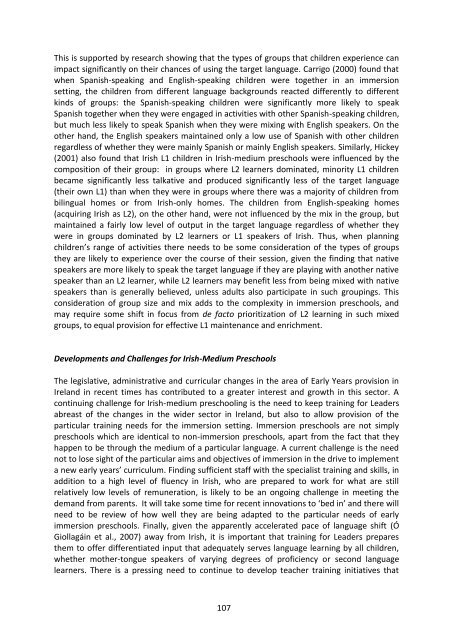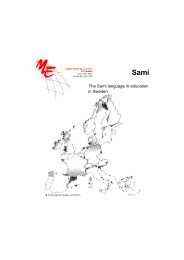Multilingual Early Language Transmission (MELT) - Mercator ...
Multilingual Early Language Transmission (MELT) - Mercator ...
Multilingual Early Language Transmission (MELT) - Mercator ...
Create successful ePaper yourself
Turn your PDF publications into a flip-book with our unique Google optimized e-Paper software.
This is supported by research showing that the types of groups that children experience can<br />
impact significantly on their chances of using the target language. Carrigo (2000) found that<br />
when Spanish-speaking and English-speaking children were together in an immersion<br />
setting, the children from different language backgrounds reacted differently to different<br />
kinds of groups: the Spanish-speaking children were significantly more likely to speak<br />
Spanish together when they were engaged in activities with other Spanish-speaking children,<br />
but much less likely to speak Spanish when they were mixing with English speakers. On the<br />
other hand, the English speakers maintained only a low use of Spanish with other children<br />
regardless of whether they were mainly Spanish or mainly English speakers. Similarly, Hickey<br />
(2001) also found that Irish L1 children in Irish-medium preschools were influenced by the<br />
composition of their group: in groups where L2 learners dominated, minority L1 children<br />
became significantly less talkative and produced significantly less of the target language<br />
(their own L1) than when they were in groups where there was a majority of children from<br />
bilingual homes or from Irish-only homes. The children from English-speaking homes<br />
(acquiring Irish as L2), on the other hand, were not influenced by the mix in the group, but<br />
maintained a fairly low level of output in the target language regardless of whether they<br />
were in groups dominated by L2 learners or L1 speakers of Irish. Thus, when planning<br />
children’s range of activities there needs to be some consideration of the types of groups<br />
they are likely to experience over the course of their session, given the finding that native<br />
speakers are more likely to speak the target language if they are playing with another native<br />
speaker than an L2 learner, while L2 learners may benefit less from being mixed with native<br />
speakers than is generally believed, unless adults also participate in such groupings. This<br />
consideration of group size and mix adds to the complexity in immersion preschools, and<br />
may require some shift in focus from de facto prioritization of L2 learning in such mixed<br />
groups, to equal provision for effective L1 maintenance and enrichment.<br />
Developments and Challenges for Irish-Medium Preschools<br />
The legislative, administrative and curricular changes in the area of <strong>Early</strong> Years provision in<br />
Ireland in recent times has contributed to a greater interest and growth in this sector. A<br />
continuing challenge for Irish-medium preschooling is the need to keep training for Leaders<br />
abreast of the changes in the wider sector in Ireland, but also to allow provision of the<br />
particular training needs for the immersion setting. Immersion preschools are not simply<br />
preschools which are identical to non-immersion preschools, apart from the fact that they<br />
happen to be through the medium of a particular language. A current challenge is the need<br />
not to lose sight of the particular aims and objectives of immersion in the drive to implement<br />
a new early years’ curriculum. Finding sufficient staff with the specialist training and skills, in<br />
addition to a high level of fluency in Irish, who are prepared to work for what are still<br />
relatively low levels of remuneration, is likely to be an ongoing challenge in meeting the<br />
demand from parents. It will take some time for recent innovations to ‘bed in’ and there will<br />
need to be review of how well they are being adapted to the particular needs of early<br />
immersion preschools. Finally, given the apparently accelerated pace of language shift (Ó<br />
Giollagáin et al., 2007) away from Irish, it is important that training for Leaders prepares<br />
them to offer differentiated input that adequately serves language learning by all children,<br />
whether mother-tongue speakers of varying degrees of proficiency or second language<br />
learners. There is a pressing need to continue to develop teacher training initiatives that<br />
107



